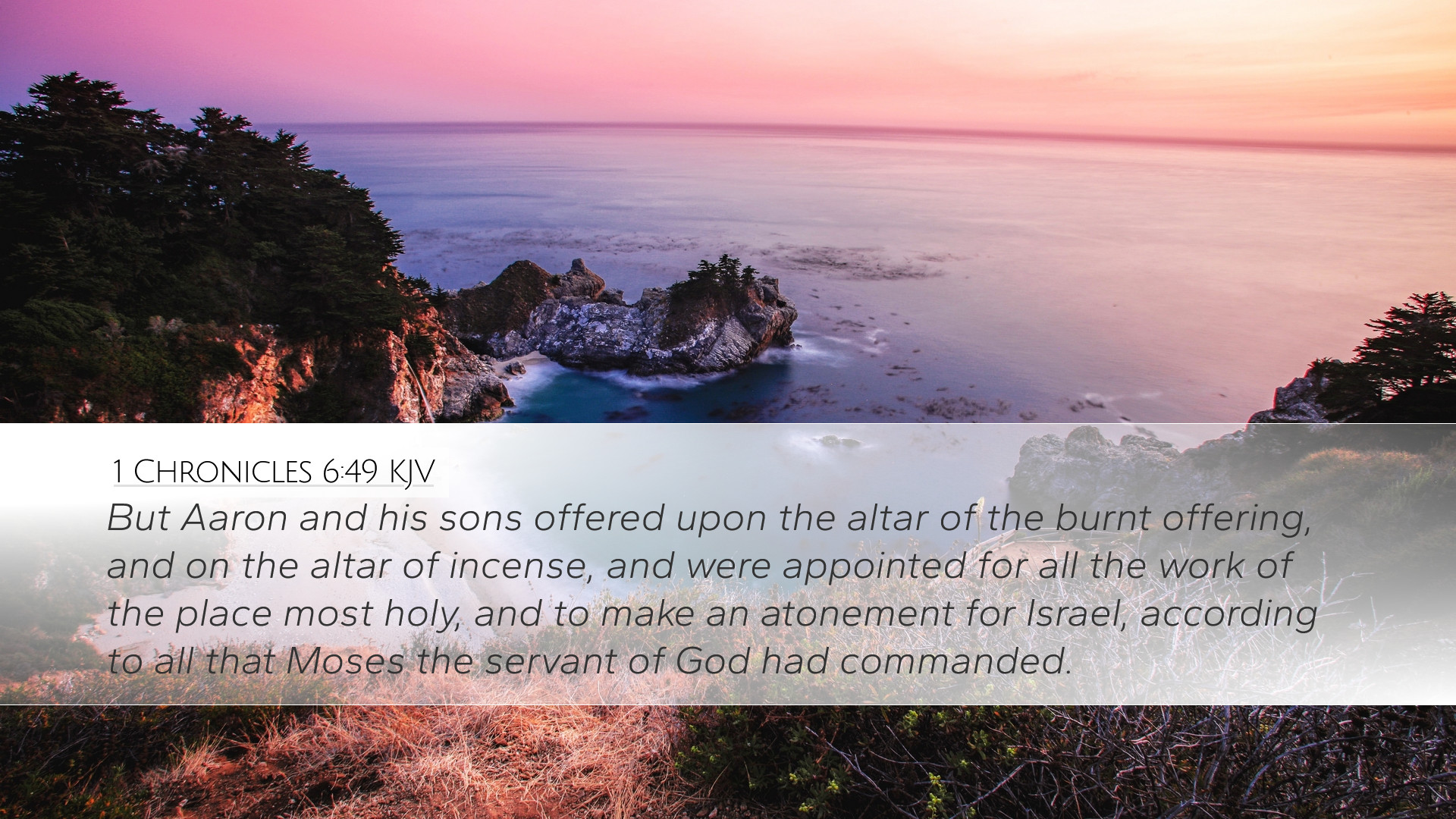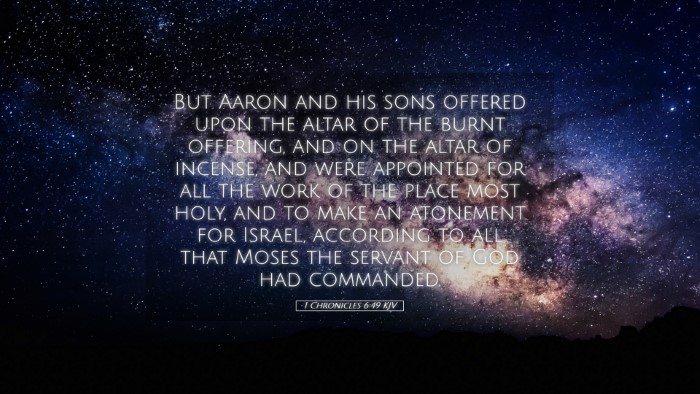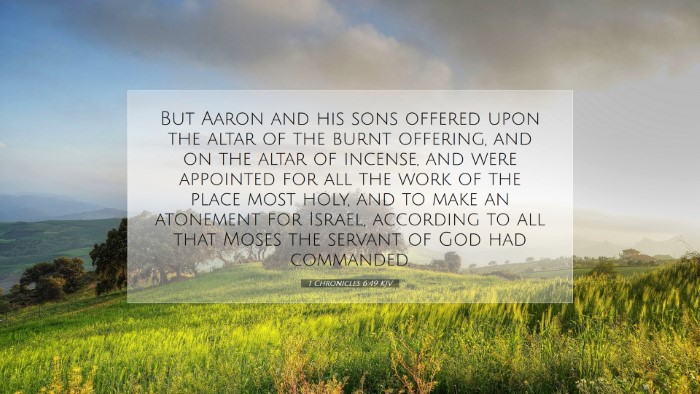Bible Commentary on 1 Chronicles 6:49
Verse Context: 1 Chronicles 6:49 states, “But Aaron and his sons offered upon the altar of the burnt offering, and on the altar of incense, and were appointed for all the work of the most holy places, and to make an atonement for Israel, according to all that Moses the servant of God had commanded.” This verse encapsulates the divine appointment of Aaron and his sons in the sacrificial system of Israel, highlighting the importance of priesthood and the centrality of worship.
Significance of Aaron and His Sons
The lineage of Aaron is significant as it represents the priestly class set apart by God for the service of worship and sacrifices. As Matthew Henry notes, "This family was chosen by God for a great and holy office, that in the offering of sacrifices and in the approach to God, they might serve as mediators." The priesthood was not merely a role but a sacred covenant that underscores the seriousness of worship and the need for intercession.
Role in the Atonement
According to Albert Barnes, this verse stresses the priestly responsibility for atonement. Aaron and his sons were appointed as intermediaries between God and Israel, making sacrifices to cover the sins of the people. This foreshadows the ultimate sacrifice of Christ, which would perfect the system of atonement. Barnes emphasizes that the systematic offering provided a means for Israel to maintain their covenant relationship with God.
The Altar of Burnt Offering
The reference to the altar of burnt offering signifies the foundational aspect of sacrificial worship. Adam Clarke expounds on this by recognizing that the burnt offerings were entirely consumed, symbolizing total surrender to God. He remarks, "This act did not only signify the dedication of the offerer but also points towards the complete expiation of sin." This imagery demonstrates God’s requirement for holiness and the profound cost of sin.
The Priestly Office: Sacred Duties
- Divine Appointment: The appointment of Aaron and his sons was established by divine command, illustrating the seriousness with which God undertook the establishment of worship in Israel.
- Service in the Most Holy Place: The priests were responsible for the most sacred tasks, including entering the Most Holy Place, which symbolizes direct access to God.
- Continuity of Worship: Their duties ensured the continuity of worship practices and reminded the people of their covenant with God.
Theological Implications for Worship
This verse serves as a crucial reminder of the importance of having designated leaders in worship, which can be seen in modern ecclesiology. Matthew Henry notes that “The church today ought also to recognize the significance of leadership roles designed to facilitate worship.” The role of the priesthood in Israel sets a precedent for the church's leadership and worship practices.
Contrast with New Covenant
While the priesthood of Aaron was divinely instituted, the New Testament speaks of a new priesthood in Christ (Hebrews 7). John Calvin suggests that this transition reflects God's unfolding plan for redemption, emphasizing that Christ is the greater High Priest who fulfills and surpasses the services of the Levitical priesthood. The once-offered sacrifices become irrelevant as believers have full access to God through Christ’s atonement.
The Role of Atonement
The sacrificial system established through Aaron’s lineage finds its fulfillment in the ultimate atonement provided by Jesus (see Hebrews 10). Therefore, this verse emphasizes the ongoing need for acknowledging sin and the pathway to restoration. It teaches an essential principle for its audience — recognizing that worship is an act of intimacy with a holy God who desires reconciliation with His people.
Practical Lessons for Modern Congregations
- Importance of Leadership: This verse underscores the necessity of spiritual leadership in the church. Just as the sons of Aaron were appointed for the sacred duties, contemporary churches need leaders who are called and equipped to facilitate worship.
- Understanding Sacrifice: Modern believers are called to understand the weight of Christ's sacrifice. The concept of atonement invites deeper reflection on personal sin and the holiness of God.
- Engagement in Worship: Participation in corporate worship should reflect the seriousness with which the Israelites viewed their sacrificial system. Congregants ought to approach worship with reverence and understanding, influenced by the sacrifices ordained by God through Aaron’s line.
Conclusion
1 Chronicles 6:49 invites us to view worship as a divine mandate involving sacrificial commitment. The historical account of Aaron and his sons serves as both an example and a foreshadowing of Christ's greater fulfillment. The implications of this passage extend beyond its historical context, challenging modern readers—pastors, students, theologians, and scholars alike—to examine the nuances of worship, leadership, and the ongoing significance of atonement. Recognizing the priestly role appointed to Aaron provides a rich theological framework for understanding our current calling as a royal priesthood in Christ.


